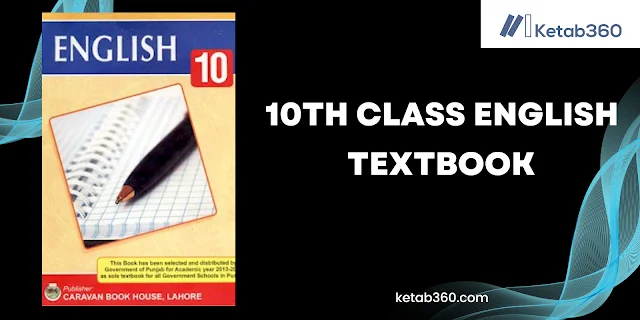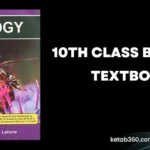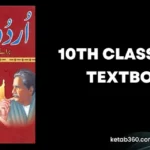Matric Class (10th Class) English Book By Punjab Board
You can access the latest version of the 10th Class Matric English book for both English and Urdu Medium students from the Punjab Education website. The English book is essential as it serves as a means of international communication and is the official language in Pakistan. During the pandemic, the significance of English has further increased for daily communication and business purposes.
The Pakistani educational system aims for instrumental motivation in language acquisition. This implies that the English coursebook taught at the higher secondary and secondary levels is designed to equip students with the ability to communicate globally and secure good job opportunities where language proficiency can be a crucial factor.
What does the book contain?
The book is created in accordance with the 2006 national curriculum and published by Caravan publishers. The content aims to foster cognitive development through language. Each unit emphasizes reading, writing, and oral communication skills.
Furthermore, linguistic comprehension is of utmost importance, and thus, each chapter introduces a comprehensible vocabulary with new phrases and words. The reading material provides students with exposure to diverse writing styles, such as biographical, argumentative, expository, and suggestive.
Additionally, each chapter begins with a pre-reading introduction, acquainting students with new words and helping them grasp the nuances of the lexical content before delving into the chapters.
Chapter No 1 : Hazrat Muhammad PBUH.
This chapter focuses on the biographical writing style in English, elucidating the remarkable personality of the last prophet of Islam. The text and exercises center around the use of regular and irregular verbs.
Additionally, it emphasizes the use of concrete and abstract nouns, empowering students to compose on any personality. The section includes a reading comprehension with corresponding questions. Each paragraph is structured with a topic sentence and supporting sentences, teaching students how to construct texts and write about various sub-topics.
Regarding grammar, this chapter covers the following topics:
- Noun phrases.
- Concrete and abstract nouns.
- Use of indefinite and definite articles.
- Past definite and continuous tenses.
For oral skills, the chapter provides:
- A pronunciation table illustrating symbols and sounds for various syllables.
- Utilization of different expressions for sharing opinions.
Regarding writing skills, it offers:
- Paragraph writing.
- Editing and proofreading.
- Precise writing.
Chapter No 2 : Chinese New Year.
The Chinese New Year brings a refreshing glimpse of the world’s diversity and an opportunity to explore various Chinese traditions. From a language learning perspective, this chapter introduces students to simple past and present tenses.
Additionally, the chapter emphasizes summary writing and reading comprehension. The glossary might present some difficulty, but it is essential for those interested in writing about traditions, culture, and social changes.
For reading skills, this chapter offers:
- Reading comprehension to enhance scanning and text analysis.
- Question-answers exercises.
Regarding grammar, it covers:
- The concept of collective nouns.
- Use of “must” and “must not.”
- Present indefinite and present continuous tenses.
- Proper usage of hyphens.
For oral and communication skills:
- Use of speech chunks to explain facts about something.
To improve writing skills, it includes:
- Summary designing.
- Essay writing.
Chapter No 3 : Try Again (A Poem).
This poem is linked to the moral-giving poem “King Bruce and the spider,” demonstrating how themes can be similar, but the expression and design of the literature differ.
In terms of expanding the lexicon, students will learn different words and their synonyms. They will explore the use of various degrees of adjectives and their beautiful incorporation in poetry.
For the vocabulary section, students are required to:
- Find the meanings of different new words.
- Write synonyms of slightly familiar words used in the poem.
Regarding reading skills, students will learn:
- How to identify and understand similes and their significance.
- Reading comprehension.
For grammatical concepts, the chapter covers:
- Future indefinite tense.
- Degrees of adjectives.
- Personal nouns.
For oral skills, the focus is on:
- Expressions to show anger.
To enhance writing skills, the chapter includes:
- Paraphrasing of stanzas.
- Summary of the poem.
- Paragraph writing.
Chapter No 4 : First Aid.
This chapter offers descriptive and informative literature, focusing on various concepts simultaneously. Students will learn about first aid kits and their application in dealing with emergencies. It also emphasizes writing personal accounts to enhance writing skills.
In the vocabulary section, students will encounter words specific to the medical and emergency field. They will learn about the use of prefixes and how they contribute to word meaning. Additionally, they will create sentences using new compound words.
For reading skills, the chapter includes:
- Providing correct answers for fill in the blanks.
- Questions and answers related to the text.
- Scanning the sequence of sentence structure in English.
In terms of grammar, the chapter covers:
- The positioning of adverbs.
- Gerunds and infinitives.
- Passive voice.
For oral communication skills, the focus is on:
- Expressions used for apologizing.
For writing skills, the chapter involves:
- Paragraph writing.
- Writing a personal narrative.
Chapter No 5 : The Rain (A Poem).
This short poem is designed to help students comprehend how they can express their love for nature using different synonyms and antonyms in English. The chapter covers various aspects:
For vocabulary:
- Antonyms and synonyms.
- Denotation and connotation of different words.
For reading skills:
- Understanding the concept of metaphor.
- Engaging in reading comprehension activities.
- Learning about the concept of personification.
For Grammar:
- Understanding transitive and intransitive verbs.
- Recognizing active and passive voice.
For oral skills:
- Learning to ask and give directions.
- Enhancing presentation skills.
For writing skills:
- Identifying the main idea of the poem.
- Writing a summary of the poem.
- Paraphrasing the stanzas.
Chapter No 6 : Television Vs. Newspaper
This chapter holds immense excitement for students as it delves into a transformative topic impacting lives. It will provide insights into determining the better option. In terms of language skills, it focuses on the use of first conditional sentences.
Students will learn about constructing arguments while maintaining coherence in the text. Additionally, since the topic compares two contrasting ideas, students will gain an understanding of writing a comparative essay.
For vocabulary:
- Learning new words and their meanings.
- Forming nouns.
For reading skills:
- Analyzing the text.
- Identifying text patterns.
- Comparing different texts.
For Grammar:
- Understanding modal verbs.
- Recognizing active and passive sentences.
- Using first conditional sentences.
For oral communication:
- Expressions to show agreement.
For writing skills:
- Practicing precise writing.
- Writing comparative essays.
- Composing a letter.
Chapter No 7 : Little by little, one walks far.
This chapter offers an autobiographical narrative where the author shares personal life experiences and learning. Students will gain insights into how an author expresses their perspective through their life journey.
Regarding language skills, students will learn various writing styles and vocabulary used for conveying personal experiences.
For vocabulary:
- Understanding word meanings in context.
- Translating to Urdu.
For reading skills:
- Engaging in scanning activities.
- Providing answers to questions.
For Grammar:
- Understanding indefinite pronouns.
- Recognizing the present perfect tense.
For oral communication skills:
- Analyzing interviews.
- For writing skills:
Essay writing.
- Formal letter writing.
- Application writing.
Chapter No 8 : Peace (A Poem).
Imagery stands as an indispensable and crucial tool of expression in any language. This poem delves into the utilization of imagery as a potent poetic device. It carries a romantic essence. In terms of language skills, students will acquire knowledge of new lexical items, types of pronouns, and present tenses.
Vocabulary:
- Identifying words based on their given meanings.
- Recognizing words with a positive connotation.
Reading skills:
- Comprehending the concept of imagery.
- Providing answers to questions.
Grammar:
- Distinguishing different kinds of pronouns.
- Recognizing present and past participles, gerund phrases, prepositional phrases, and infinitive phrases.
Oral communication skills:
- Differentiating between functional and content words.
- Understanding the use of stress in dialogue.
Writing skills:
- Engaging in paragraph writing.
- Determining the main idea of a poem.
Chapter No 9 : Selecting The Right Career.
The subject matter of this chapter holds paramount importance in a student’s life. Therefore, discussing it in English is crucial to leave a favorable impression as a knowledgeable individual. Additionally, the organization of the text exemplifies the significance of maintaining coherence while presenting an argument.
Moreover, this chapter introduces various professional phrases, often termed as field-specific words.
For the vocabulary section, the following activities are included:
- Determining the meanings of words.
- Creating sentences with new vocabulary.
- Utilizing a dictionary effectively.
- Providing appropriate names for given descriptions.
For reading skills, the chapter includes:
- Utilizing graphic organizers to structure the text.
- Responding to questions related to the content.
Regarding grammar, the chapter covers:
- Understanding noun clauses.
- Grasping the concept of present perfect continuous tense.
- Learning the proper usage of “since” and “for.”
To enhance oral communication skills, the chapter incorporates:
- Expressing opinions effectively.
As far as composing abilities, understudies will participate in:
- Composing formal letters.
- Writing applications.
Chapter No 10 : A World Without Books?
The concept of this literary piece is truly thought-provoking. It emphasizes the importance of book reading and writing, and this chapter elaborates on these aspects. For language skills, it introduces numerous general yet unique words that most students might be unfamiliar with. Reading this chapter will be a delightful experience as the author provides a fresh perspective on book reading.
For vocabulary, this chapter includes the following activities:
- Explaining and discussing phrases.
Regarding reading skills, the chapter offers:
- Questions and answers.
For grammar, it covers:
- Relative pronouns.
- Adjective clauses.
- Second conditional sentences.
- Questions in the passive voice.
To enhance oral communication skills, students will learn:
- Expressions for agreement and disagreement.
As far as composing abilities, understudies will participate in:
- Writing and reading letters.
- Writing an argumentative essay.
Chapter No 11 : Great Expectations.
This chapter takes an interesting turn. Up until now, 10th-grade students have only been introduced to non-fiction. However, this chapter presents a fictional passage. It aims to help students understand the creation of various fictional characters in a story or novel.
Regarding language skills, students will learn the use of statements in creative writing and the development of new words using root words.
For vocabulary, the chapter includes the following activities:
- Extracting meaning from expressions and phrases.
- Making meaning from root words.
Regarding reading skills, students will engage in:
- Story mapping analysis.
- Arranging events of a story.
For grammar, the chapter covers:
- Past perfect tense.
- Past perfect continuous.
- Direct and indirect speech.
- Active and passive voice.
To enhance writing skills, students will explore:
- Character sketching.
- Writing reviews of stories.
Chapter No 12: Population Growth & World Food Supplies.
Many students often struggle with explaining socio-economic facts in English. This chapter aims to help them by introducing the most common terms and facilitating a friendly and slightly formal discussion about the major concerns of states and countries.
For vocabulary, this chapter offers:
- Learning new terms through sentence creation.
For reading comprehension, students will engage in:
- Using graphic text organizers.
- Answering questions related to the text.
In terms of grammar, the chapter covers:
- Subordinating conjunctions.
- Adverb clauses.
For oral communication skills, students will learn:
- How to present on a topic.
For writing skills, the focus is on:
- Essay writing.
Chapter No 13 : The Faithfulness.
In this chapter, we delve into the life of the Caliph of Islam, Hazrat Umar, through a historical narration. While the text bears similarities to the first chapter, it introduces many new words. Students will also learn to incorporate dialogues into a text.
For the vocabulary, this chapter covers:
- Creating new words with prefixes.
- Using phrasal verbs.
- Using words as nouns and verbs.
For reading skills, students will engage in:
- Answering questions for simple reading comprehension.
Regarding grammar, the chapter includes:
- The third conditional sentences.
- Compound sentences.
- Complex sentences.
- Use of comma.
- Direct and indirect speech.
For oral communication skills, students will practice:
- Expressions for saying how often.
- Role plays.
In terms of writing skills, the focus is on:
- Character sketching.
Review Exercises.
The book comprises three review exercises, one after the 4th chapter, another after the 8th chapter, and the final one at the end of the book. These exercises combine different concepts learned in the preceding chapters.






